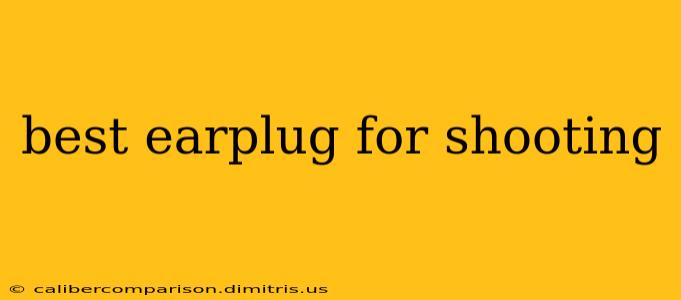Shooting sports and recreational firearm use are enjoyable activities, but they come with a significant risk: noise-induced hearing loss. Protecting your hearing is paramount, and choosing the right earplugs is crucial. This comprehensive guide will help you navigate the world of hearing protection and find the best earplugs for shooting that suit your needs and budget.
Understanding Hearing Protection for Shooting
The intense sounds produced by firearms can cause irreversible damage to your hearing, even with a single shot. Hearing protection isn't just about comfort; it's about safeguarding your long-term auditory health. There are two main types of hearing protection: earplugs and earmuffs. While earmuffs offer excellent protection, many shooters prefer earplugs for their discreet nature and compatibility with earmuffs for superior noise reduction (using both is highly recommended).
This guide focuses on earplugs, breaking down the key factors to consider when choosing the best option for you:
Key Factors to Consider When Choosing Earplugs for Shooting
-
Noise Reduction Rating (NRR): This number indicates the amount of noise reduction provided by the earplug. A higher NRR means more protection. For shooting, an NRR of 25 or higher is generally recommended. However, remember that the actual noise reduction achieved can vary depending on how well the earplug fits.
-
Comfort and Fit: Discomfort can lead to improper usage and reduced effectiveness. Consider factors like material, shape, and size to find earplugs that fit comfortably and securely in your ears. Different earplug types offer varying levels of comfort.
-
Material: Earplugs are made from various materials, including foam, silicone, and custom-molded materials. Each has its advantages and disadvantages regarding comfort, durability, and reusability.
-
Reusability: Disposable foam earplugs are cost-effective but need replacing after each use. Reusable silicone or custom-molded earplugs are more expensive upfront but offer long-term cost savings.
-
Ease of Use: Some earplugs are easier to insert and remove than others. Consider your dexterity and the environment in which you'll be using them.
Types of Earplugs for Shooting
Here's a breakdown of common earplug types:
1. Foam Earplugs:
- Pros: Inexpensive, readily available, good noise reduction for their price point.
- Cons: Disposable, can be uncomfortable if not properly inserted, may not provide a consistent seal.
2. Silicone Earplugs:
- Pros: Reusable, more comfortable than foam for many users, good noise reduction, relatively inexpensive compared to custom-molded.
- Cons: Can be more difficult to clean properly than some other types.
3. Custom-Molded Earplugs:
- Pros: Superior comfort and fit, excellent noise reduction, long-lasting.
- Cons: Most expensive option, requires a professional impression, not as easily replaceable if lost or damaged.
Top Recommendations (Note: This is not an exhaustive list, and specific product availability may vary):
While I cannot endorse specific products, researching earplugs with high NRR ratings from reputable manufacturers will be crucial in making your selection. Always read reviews and compare features before making a purchase. Look for earplugs specifically designed for shooting and consider the factors outlined above.
Beyond the Earplugs: Maximizing Hearing Protection
Remember that earplugs alone might not offer sufficient protection against the intense sounds of firearms. Combining earplugs with earmuffs provides a higher level of protection—a strategy many experienced shooters employ. This layered approach significantly reduces the risk of hearing damage.
Conclusion: Protecting Your Hearing is an Investment
Choosing the best earplugs for shooting is crucial for protecting your hearing. Consider your individual needs, budget, and the factors discussed above to make an informed decision. Don't compromise on your hearing health – it's an investment that will pay dividends for years to come. Remember to always consult with a hearing professional if you have any concerns or experience any hearing-related issues.

